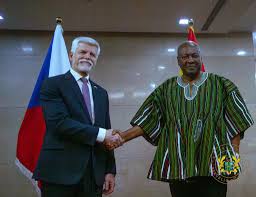President John Dramani Mahama and the President of the Czech Republic Petr Pavel have expressed their concerns about the global economic impact of the new tariffs announced by the United States (US).
It would be recalled that US President Donald Trump on April 2, declared a US economic emergency and announced tariffs of at least 10 per cent across all countries, with rates even higher for 60 countries or trading blocs that have a high trade deficit with the US.
Responding to questions during a media briefing at the Flagstaff House in Accra after a bilateral meeting, President Mahama and President Pavel reiterated that they all accepted the rule-based trading system, because it had served the world well.
President Pavel, who is on a three-day state visit to Ghana, said: “I think imposing tariffs in such a brutal way really doesn’t help either side. It will not help the situation in Africa, but it will not help the situation in Europe, Asia, and even the United States”.
“Tariff wars are damaging everyone. So, in my view, it is really unfortunate to impose such a broad wave of tariffs without negotiating.”
He noted that countries, especially countries that were allies, should first negotiate, and only when they were not able to come to an agreement that they could exert some pressure.
President Pavel said however, they hadn’t explored the opportunities of negotiating.
“With regard to a number of African and Asian countries, especially those that belong amongst the poorest globally, like Lesotho or Cambodia and Laos, they are charged by the biggest tariffs in history. It could be easily destroying their economies,” President Pavel stated.
“So, I really think that we have to collectively address the United States to rethink this approach and to negotiate. Because I believe that only by negotiating, we can achieve a result that will be both beneficial for the United States, balancing more of their trade with the world, but also not destroying countries.”
This, he said, was because by damaging their economies so much, it would create a number of problems that would have to be dealt with later on that might prove much more costly than reducing the pressure on tariffs.
On his part, President Mahama said Ghana’s Minister of Foreign Affairs and the Minister of Trade, Agribusiness and Industry, held a session with the US Ambassador to Ghana to clarify what the implications of the tariff were for Ghana particularly.
He said within the next few days; the Minister of Foreign Affairs would release a statement on what the implications of those tariffs were.
President Mahama said the rule-based trading system had served the world well because it had led to quite significant growth in gross domestic products (GDP) across the world.
“It is unfortunate that without resorting to the rules-based system, one country unilaterally decides to increase tariffs across the world on all countries,” President Mahama stated.
“Ghana got slapped with 10 per cent, which is the lowest in the tariffs that were ruled out.”
President Mahama said however, a country like Lesotho got slapped with 46 per cent. And if you understand that one of the largest contributors to Lesotho’s economy is the trade and garments industry, exports under AGOA (African Growth and Opportunity Act) to the United States, then you can be sure that it’s going to affect a small country like Lesotho.
“Many of the factories that are set up there might look for areas where they can receive cheaper tariffs, you know, to be able to continue to export into the American market.”
President Mahama said the recent tariff increase announced by the US Government would have very severe implications for everybody.
“And I believe that a multilateral world serves us all better than a unilateral world where people just take decisions based on only their country’s interests,” he said.
“We must look at the broader global partnerships and the global interests rather than just our parochial national interests.”
GNA



